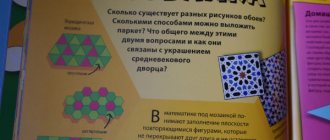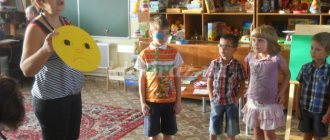Organization of search activities of preschool children
Bibliographic description:
Minullina, R. F. Organization of search activities of preschool children / R. F. Minullina, R. V. Ryzhmanova. — Text: direct // Education and upbringing. — 2021. — No. 1 (27). - pp. 11-12. — URL: https://moluch.ru/th/4/archive/154/4848/ (access date: 12/19/2021).
This article reveals the content and methodology for organizing the search activities of older preschoolers in the light of the federal state educational standard for preschool education.
Key words: federal state educational standard, Federal State Educational Standard, preschool education, activity, problem situation, cognitive task.
In accordance with the requirements of the Federal State Educational Standard of Preschool Education for the results of mastering the basic educational program, presented in the form of targets, at the stage of completion of preschool education, “the child shows curiosity, asks questions to adults and peers, is interested in cause-and-effect relationships, and tries to independently come up with explanations for phenomena nature and actions of people; inclined to observe and experiment.”
The scientific search for effective means of achieving the designated guidelines represents an urgent problem that requires theoretical and practical solutions. Among the possible means of developing the cognitive activity of preschoolers, search activity deserves special attention.
Elementary search activity is the joint work of the teacher and children, aimed at solving cognitive problems that arise in educational activities, in everyday life, in play and work, in the process of learning about the world.
The emergence and development of almost limitless search and research activities aimed at understanding the world around us is based on the child’s need for new impressions, given by nature itself. The more varied and intense the search activity, the more new information the child receives, the faster and more fully he develops.
Search activities are carried out in a specific system. It begins with the teacher setting and children accepting a cognitive task; it is also possible for children to set a cognitive task. Then its primary analysis is carried out and assumptions are made, methods for testing the assumptions put forward by children are selected, and they are verified. The search activity ends with an analysis of the results obtained during the inspection and the formulation of conclusions.
Elementary search activity as a form of organization is used in older preschool age. In accordance with the educational program, the teacher develops a system of cognitive tasks that he gradually sets for the children. For this, it is important to create problem situations in classes or in various activities, in everyday life, in play, work, and in the process of learning about the world.
A problematic situation arises when a problem already exists, but its solution is not immediately available to children. An effort of thought is required to compare already known facts and draw some conclusions. Children’s independent work in such a situation is exploratory in nature.
After the children accept the cognitive task, under the guidance of the teacher, it is analyzed, the known and the unknown are identified. As a result of such an analysis, under the guidance of the teacher, assumptions are made about the possible causes of the observed phenomena.
The assumptions made by children may be correct, incorrect, or even contradictory. But at the same time, they all need to be discussed. It is important to listen to all the children’s assumptions and pay attention to their inconsistencies. offer to check whose is more correct. If the children do not make assumptions, the teacher encourages them to do so or makes the necessary assumptions himself.
During the analysis and evaluation of assumptions, children develop interest and it should be used to move to the next stage of search activity - consideration of verification options and the verification itself.
Children usually offer different methods of verification, and the teacher can also offer them: short-term recognition observations, long-term comparative observations, elementary experiments, demonstration of models, heuristic conversations, etc.
Formulation of conclusions is the final stage of search activity. It is necessary to encourage children to formulate conclusions on their own, take the time to give them hints, listen to all the children’s statements, and ask questions to guide their thoughts in the right direction. If children's conclusions are incorrect, additional experiments or observations can be organized so that everyone comes to the correct conclusions.
We conducted an experimental study of the level of development of search activity by determining the cognitive activity of children of senior preschool age. For this purpose, the method of V. S. Yurkevich “Tree of Wishes” and the standardized questionnaire “Curious, active” by V. S. Yurkevich, Yu. A. Baranova were used.
During the diagnostics, it was revealed that the level of development of cognitive activity in children mainly corresponds to the average and low level. To increase the level of search activity of preschoolers, it is necessary to develop a number of measures that will contribute to the development of children’s cognitive activity and maintaining interest in search activities.
It is recommended to arrange and equip the following in the group:
– (card file of classes on research teaching methods, reading fiction: “The Great Encyclopedia for Preschoolers”, the encyclopedia “Everything about Everything”, etc.).
– Club of experts “I explore the world” (summarizing experience on topics being developed, preparing reports, monitoring, presentations of scientific works).
– Game center (verbal games, educational games and exercises).
– Mini (experimental corner).
Thus, in the process of organizing search activities, children acquire the ability to independently set cognitive tasks that reflect a deeper penetration into the essence of phenomena, the establishment of analogies, and an understanding of increasingly general patterns.
Literature:
- AbdrakhmanovaA. I. Current state of the problem of the formation of cognitive activity in children of senior preschool age. // Bulletin of Tomsk State Pedagogical University. - 2015. - No. 3. - P. 38–41.
- Ismatullaeva M. G. Formation of cognitive and personal activity in preschool children. URL.https://cyberleninka.ru (date of access: 01/09/2020).
- Shchetinina V.V. Formation of cognitive activity of children of senior preschool age in the process of search activity. M.: 2006.-126s.
- Yurkevich V.S. Development of initial levels of cognitive needs among schoolchildren // Questions of psychology. — 1980. — No. 2. — P. 83–92
Key terms
(automatically generated)
: search activity, preschool education, cognitive task, child, Federal State Educational Standard, everyday life, cognitive activity of children, problem situation, senior preschool age, elementary search activity.
Cognitive and research activity as a natural need of a child
Have you noticed how your child looks with interest at a piece of wood floating in a rain stream or how he is sincerely surprised by the frosty patterns on the winter windows? And numerous questions in the process of watching birds or milk running onto the stove: “Why?”, “Where from?”, “Why?”, “How?”. This behavior of a child is natural and only confirms that he, due to his age, is a researcher. Genetically predetermined search activity creates conditions for the child’s mental development to initially follow the path of self-development.
It should be noted that children are in special conditions: they are bombarded with information every day, and their knowledge is extremely limited.
What is important for a child’s development is not the amount of knowledge transferred to him, but how he appropriates it. This is why the exploratory nature of reflection and action is so important.
The preschooler observes, reasons, and his own discoveries arise. It is this kind of experience that is firmly assimilated by the child, and he subsequently uses it when faced with a familiar situation.
Younger preschoolers show the simplest cognitive activity. By interacting with objects, observing what is happening, asking questions, they assimilate primary information. This is their – and very valuable – way of understanding the world.
Every year the interests of children deepen. Older preschoolers are no longer just interested, but are trying to get to the bottom of the truth. Their activity is aimed at finding a solution, testing experimentally the properties of objects, and unraveling natural phenomena. Actually, the formation of cognitive and research activities is taking place.
The adult’s task is to stimulate the child’s natural search activity and develop his research abilities.
Types of cognitive and research activities in preschool age
A child of preschool age comprehends the world around him only in those ways that are available to him due to limited experience. He can ask questions about the new and incomprehensible, he can reason and even come up with unexpected hypotheses. Can experimentally check what will happen if...
All of the listed methods of children's activity perform a search and research function. Thanks to them, the preschooler discovers a lot of new things, gradually broadens his horizons and forms his own picture of the world.
Asking questions
Children's thoughts usually begin with a question. Asking an adult about what interested or surprised is the simplest and most accessible type of cognitive research activity for a preschooler.
In preschool age, almost all children’s questions are cognitive in nature and are aimed at understanding the essence of phenomena, processes, and patterns. A child may wonder why a cat has soft fur and a hedgehog has sharp spines, why a bicycle doesn’t fall while moving, how light “gets” into a light bulb, etc.
Heuristic questions (leading to discoveries) arise in children because they are faced with a certain problem, intellectual complexity, or practical task. For example, after hearing thunder, a preschooler shoots out questions, trying to understand how and why the roar is formed, where the source of such powerful sounds is located.
When asking questions, the child shows great persistence in finding an answer and demands detailed and reasoned explanations from adults.
Reasoning
For many preschoolers, answers to exciting questions push them to further reasoning. New knowledge must take its place in the child’s perception of the world, and for this there is not enough understanding of how it is connected with everything that the child already knows.
An inquisitive preschooler begins to think based on facts and images already known to him. “Birds fly south, but how will they find their way back? There are no roads in the sky like there are on earth,” the child is puzzled. Next, he builds a chain of inferences and draws the conclusion that the bird leader is guided by some signals.
In preschool age, reasoning is characterized by figurativeness and reliance on facts that are understandable to the child.
Experimentation
Children's experimentation is a type of cognitive research activity that allows one to discover implicit properties, transform objects, and experience objects in a new quality. Children are especially attracted to the fact that they can make tests, test their hypotheses, make as many mistakes as they want and repeat experiments.
Experiments hold children's attention and encourage them to independently search for reasons why the properties of an object or phenomenon appear in this particular way.
While observing the experiment, the child expresses his guesses. The bolder and more actively he voices different assumptions, the faster he gets to the right conclusion.


